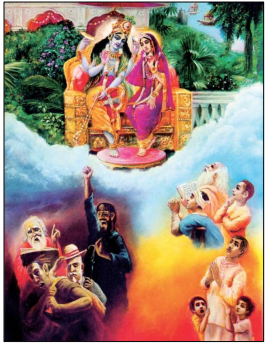Talk:Types of Bhaktas
By Vishal Agarwal
In the Bhagavad Gita, Krishna classifies his worshippers into four categories depending upon their intent.

Four types of virtuous people worship Me – the distressed, the seeker of knowledge, the seeker of wealth, and the knowledgeable. Gita 7.16
Of these, the knowledgeable worshipper, who is always established in Yog and always devoted to Me, is the best; because I am extremely dear to the wise worshipper, and he is also very dear to me. Gita 7.17
All these four worshippers are noble, but I consider the wise worshipper as my very self (or a part of Me). This is because his soul is steadfast in Yog and he pursues Me alone as his highest goal. Gita 7.18
Verse 7.18 of the Bhagavad Gītā affirms that all four types of worshippers are ‘noble’ (udārāḥ), regardless of their motivations. Seeking refuge in Bhagavān in times of distress or with aspirations for material progress is a natural expression of devotion and signifies a meaningful connection with the Divine.
In this world, most people get so distracted by material attractions that they do not spare any time for Bhagavān and have no deep relationship with Him. But it is indeed the result of good karm, or virtuous conduct in the past, that motivates the worshipper to remember Bhagavān. In fact, in the Śāstra, devotees like Queen Kunti are said to have asked Bhagavān for continuous sorrows and dangers, so that they are forced to remember Him at all times. These devotees even wish to shun worldly happiness and pleasures lest these make them forget Bhagavān for even a single moment.
Any devotee who approaches the Bhagavān is blessed by Him, but the blessing is consistent with the intent of the worshipper. Only the worshipper who loves the Lord completely without any selfish motive, desires nothing of Him, and is spiritually wise gets the complete blessing from the Bhagavān.
"It is true that the Bhagavān grants the fulfillment of their prayers to those votaries who approach Him with worldly desires. But by this He does not bestow on them the real fulfillment; for it is found that when one desire is satisfied, they approach Him with new desires. But with those who worship Him without any desire (i.e., with pure love), He, out of His own accord, bestows on them His grace, which roots out all wants. Bhāgavata Purāṇa 5.19.27"
